#also for the arc ender not being about him. its kind of a similar thing to niigo where yes. Kanade may be the leader of niigo
Explore tagged Tumblr posts
Text
but I just feel too tired to be fighting
this is a follow-up post to what I said in my recap the other day about this arc being the Deku Angst arc, as opposed to the Villain Hunt arc or the Deku SIXQUIRKS Exhibition arc. I feel like the fandom discussion tends to focus on the flashier parts of the chapters -- the sexy villains and the new quirk reveals and the Shindous -- each week, and so the quieter emotional beats sometimes get overlooked, especially since the character arc here is playing out in little bits and pieces over time rather than all at once.
this has always been a very reactionary fandom, and there’s a tendency to judge the chapters week to week without ever going back to look at how they all fit into the big picture. so I figured I would try to attempt that, and basically go chapter by chapter here to look at what exactly Horikoshi is setting up and how it all fits together.
so let’s start with the end of chapter 306, which is when the arc officially kicks off. specifically with the very last page:
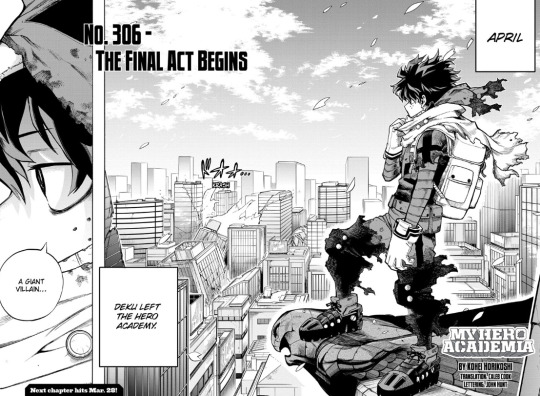
this is imo one of the best pages Horikoshi has ever drawn. I got the sense that this was a scene he’d had in his mind’s eye for quite a long time, and that he was excited to finally get to this part of the story. it’s extremely effective as both a chapter-ender, and an arc-opener. like, look at this:
it establishes the initial premise of the new arc -- the world is in chaos, and Deku is now seemingly on his own
it leaves the readers with a number of questions. why did Deku leave U.A.?? is he really on his own now?? why does he look so beat-up and exhausted?? what is he up to?? what is the world like now that all these villains have been unleashed and the heroes have been decimated?? and most importantly of all, what the fuck is going to happen next??
it pays homage to some of Horikoshi’s comic book influences -- Batman in particular
it dramatically hits us with that “THE FINAL ACT BEGINS” and lets us know that shit is getting real now
that’s some good shit. so much so that I think people tended to overlook the other notable thing about this page amidst all of the initial excitement and discussion and speculation about where the series was headed. and that is the fact that the final panel in this chapter is NOT the panel of Deku standing above the city. the very last panel, the one that this chapter actually ends on, is instead the close-up of Deku’s face. his face, which is covered in shadow; and his eyes, which have dark circles under them and are prominently missing the usual flecks of light that give him his signature “sunny optimistic shounen protagonist” look.
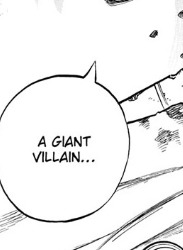
not to mention this last line here, which is a call back to the very first time we saw the 14-year-old Deku way back in chapter one.
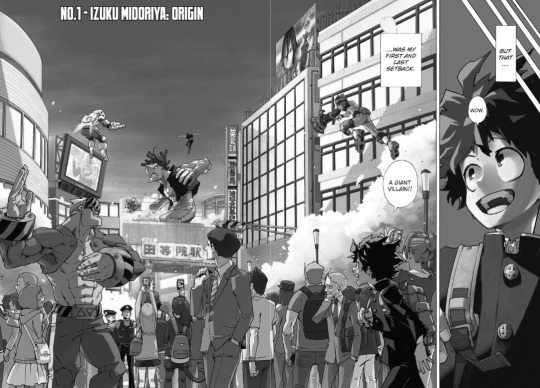
I don’t think it’s a coincidence that Horikoshi chose to throw this reference in. nor is it a coincidence that THIS is the scene he actually chose to end the chapter on. what this does is show us the drastic shift in Deku’s emotional state of mind, and his attitude towards being a hero. he’s gone from being thrilled and excited to being jaded and exhausted. he’s matured, but at a great cost. it’s always been his dream to be a hero, but “be careful what you wish for” is a popular adage for a reason. and right now he looks the furthest thing from happy.
and this is the emotional beat that Horikoshi chooses to end the chapter on. this is the panel that closes out the War arc, and begins the final act. to me the message could not be clearer -- this arc will be about the exploration of Deku’s character, and his struggle as he tries to live up to the expectations that have been placed on him as the Last Holder of OFA and quite possibly the World’s Only Hope.
it’s a character arc that builds on a lot of the things we’ve already learned about Deku over the course of the series, such as the fact that he is reckless, and that he focuses on others often at the expense of himself. but more importantly, it’s an arc that finally expands on the dark side of what has up until now been a net positive for Deku -- the power of OFA. up until this point, despite its ups and downs, it’s been a boon for Deku overall and has allowed him to pursue his dream. but now we’re finally reaching the point where the monkey’s paw part of the OFA blessing/curse finally starts to come into play. OFA gives Deku more power than he could have ever dreamed of, but it also comes with a built-in destiny that he can’t opt out of whether he likes it or not. AFO is on the loose and out there trying to destroy the world. and now everyone has pinned their hopes on this sixteen-year-old kid, and the question of whether or not the sixteen-year-old kid is ready is apparently not one that anyone feels inclined to ask (possibly because they’re afraid that the answer might be “no”).
he doesn’t have a choice in the matter. he has to do it, because there’s no one else who can. that’s the kind of pressure that is on Deku now.
and on that note, we begin the Deku Angst arc.
chapter 307
this in hindsight was mostly just a set-up chapter to better establish the current state of the BnHA world at large (spoilers: it’s not good), while also providing an answer for one of the big initial questions of the arc -- namely, “what happened to all of those villains that AFO released from Tartarus?” these are important things to touch on, but the pacing could definitely have been better, and the bulk of the chapter was dedicated to providing fanservice to all of the Shindou fans who spammed the most recent popularity poll (which, whatever lol). anyway, so this was the sole chapter thus far with absolutely no Deku development. thankfully the arc picks up from there.
chapter 308
on to the next one! this was the one and only chapter thus far which I think actually qualifies as an “exhibition fight.” this was definitely all about showing off Deku’s current powerset, as well as introducing us to another of the SIXQUIRKS. however, there was Deku development here as well, most notably in this scene:

this is the scene that got a lot of people speculating that this arc was going to focus on Deku hunting down all of the old villains. but I think people got so caught up in that speculation that they overlooked what this scene tells us about Deku’s mindset. and yes, there is new information being revealed here, and it’s not just a rehash of the stuff we already knew. like yes, we know that Deku was shaken up by the recent encounters with Dabi and Tomura, and we know that made him start questioning why villains become villains in the first place, and all that good stuff, and that’s great. however, there are two additional important things that this scene helps establish for us.
the upcoming battle with TomurAFO is weighing heavily on Deku’s mind. this is something that will become a recurring theme in this arc. Deku is thinking about this constantly. the question of what to do when he finally encounters TomurAFO again is knocking incessantly at the back of his mind, and this won’t be the last time it comes up.
Deku is using these villain encounters as test runs. can Tomura be redeemed?? is he just being stupid and naïve?? or is this really something worth attempting?? the interesting thing about this is that Deku’s resolve to save people is usually so strong and unwavering that it’s more than enough to overcome any doubts that he might have. but this time it seems like the repeated objections posed by the Vestiges and Gran Torino have really gotten to him. it’s possible I’m just reading way too much into things, but to me it really feels like Deku’s recent attempts at Talk no Jutsu were meant to do more than just show his growing awareness that the line between heroes and villains is thinner than he once imagined. they’re also serving as trial runs for the real test, when it finally comes. if he can “save” even a villain like Muscular, there’s hope for him being able to save Tomura as well. and so that moment when Muscular rejects him out of hand is all the more disappointing to him, even if it wasn’t really unexpected. basically it wasn’t the answer that he had been hoping for.
aside from those little notes though, like I said, this was unquestionably an exhibition fight first and foremost. which is fine; we needed to establish where Deku is currently in terms of strength, and it was also just fun to see him kick some ass, ngl. in terms of story purpose this chapter was similar to 219, which showed us how Shouto and Katsuki had powered up after getting their provisional licenses. people who don’t care about those characters might argue that these fights weren’t necessary, but as someone who stans all three characters hard, I would disagree! but anyways, moving on.
chapter 309
in contrast to the previous chapter, this chapter focuses more on establishing Deku’s current mental state, as opposed to his physical state. and this is what we learn:
(1) Deku is ~technically~ being shadowed/accompanied by All Might and the Hawksquad (but in practice he’s avoiding them).

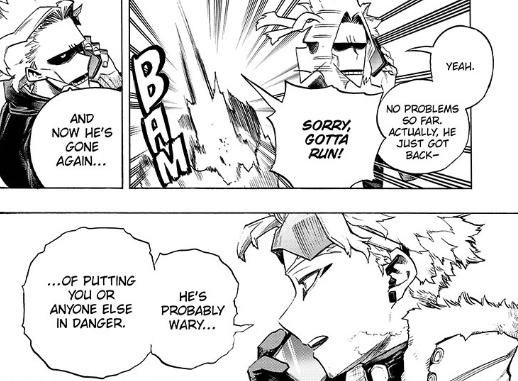
(2) it was Deku’s own decision to leave U.A., and he did it because he didn’t want anyone else getting hurt in order to protect him.
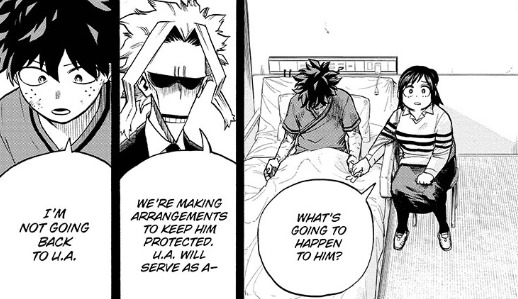

and finally, (3) Deku’s game plan is to stop Tomura and All for One before they reach full power.
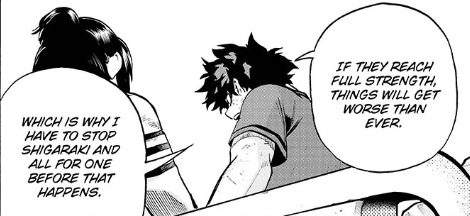
this last part is very important, because it means there’s a countdown in effect. as far as Deku is concerned, there’s only a finite amount of time before TomurAFO becomes unstoppable. which means that he’s not only under “gotta get stronger” pressure, but time pressure as well. he doesn’t have the luxury of taking his time and training in safety. he’s being rushed now; this is do-or-die.
this chapter is also the first in this arc in which we get to see Deku’s expressions without the hood covering up his face, and what we see is very telling. as previously stated, the light is gone from Deku’s eyes. he keeps his expressions very neutral, and the only time we even see a hint of a smile is when he hugs his mom in the flashback, and it’s clear from the dialogue (“it’s okay, I’ll come home to you”) that he’s doing it for her sake in order to comfort her.
but aside from that, this is very much not the Deku we’ve grown accustomed to. this is the chapter that really establishes his current mental state imo. above all else, he’s afraid that more people will get hurt because of him, and so he’s distancing himself from everyone around him. and he’s also morbidly preoccupied with the inevitability of having to face TomurAFO again, and soon. the chapter ends on the flashback of Gran giving him his cape, and telling Deku that “killing can be another way to save someone.” there’s a lot on this kid’s mind, to say the least.
chapter 310
this chapter opens with a gang of civilians who are trying to open fire on a nice fox lady whose only crime was walking around in the rain at night. Deku intervenes to save her, and it’s the first time in this arc that we see anything close to the “old” Deku, who just wanted to save people with a smile.
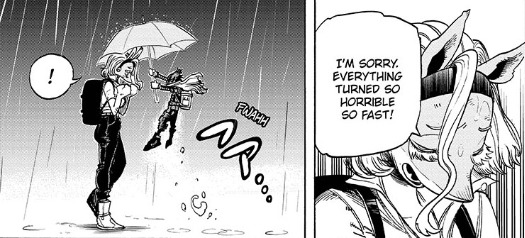
but it’s bittersweet, because all the lady can talk about is how scared she was, and how horrible everything is right now. and so Deku, who feels responsible in a lot of ways for everything that’s happened, just feels that much more pressure to somehow make things right again.
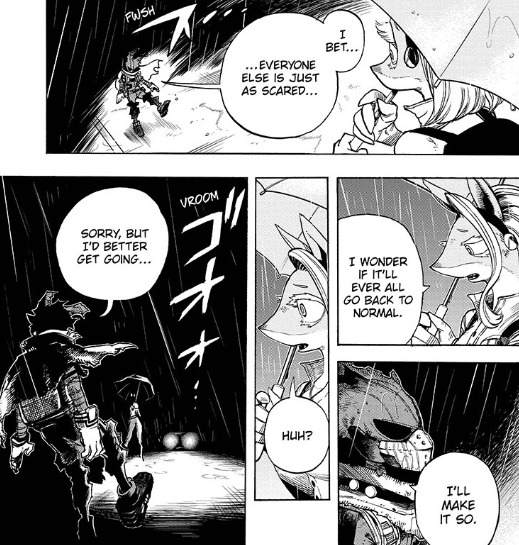
there’s also this extra throwaway line which is especially heartbreaking:

“I can’t afford to be around anyone.” fucking ouch. just reinforcing once more how incredibly isolated Deku is right now -- not by choice, but because he feels like it’s not safe to let anyone else get close to him. and so he’s out here running around this dystopian cityscape in the middle of the night in the pouring rain all on his own, and neglecting himself to the point where All Might practically has to force a bento on him.
but does he complain? of course not. because his focus is never on himself. instead, when he settles down to eat, his thoughts immediately drift back to, guess who...

it’s that time pressure once again. “unless I draw out One for All’s full power, I can’t stop any of this.” it’s just nonstop, I have to get stronger, I’m running out of time, I have to do better, and constantly thinking about that inevitable confrontation.
Deku is a thinker, you guys. and when left to his own devices he will overthink, every time. his mind will run in endless loops while he mentally works his way through all of the possibilities. and that’s one of his greatest strengths, don’t get me wrong, but at a time like this it’s also one of his greatest weaknesses. it’s just so fucking easy for him to get stuck in his own head, in his endless rambling thoughts and analyses. and without anyone else there to help distract him, or help him focus, he’s become fixated on his mission, and it’s slowly consuming him.
this, incidentally, is also the chapter in which we finally see Two and Three’s faces, and learn why Two in particular is so reluctant to lend his power to Deku. he appears to be the lone holdout at this point, so stay tuned on that, because I don’t doubt this will wind up being crucial to Deku’s future development, however it winds up playing out.
chapter 311
this chapter flips back to the Hawksquad for the first half, so we get a brief respite from the ongoing Dekuangst. right before we switch back though, we do get confirmation of something we had pretty much already guessed:

like, that much was already apparent based on what we’d seen (the bags under his eyes; the fact that he refused to sit still in any one place for very long even at night), but it’s always nice to get the official confirmation so that people can’t dispute it lol. so yeah, Deku isn’t sleeping much. and not eating much either, if all he’s getting is the occasional bento from Dadmight. so basically not taking care of himself at all, huge shocker there. but this is something that’s important enough to the story that Horikoshi took the time to point it out in the dialogue, in addition to all of the visual clues we’d already gotten.
and just in case we needed to drive that point in any further, this chapter ends with the appearance of Lady Nagant! like yeah, no shit Deku isn’t getting much sleep, what with him having to fend off racist civilians and hired assassins every five fucking minutes. smdh. can he live??
chapter 312
so this is the chapter that properly introduces Lady Nagant, who maaaay or may not be one of the primary antagonists of this arc?? like, it’s really unclear right now tbh, but she gets hyped up by Hawks and AFO, and has a flashback and a mysterious past and a weird trump card (where did you go, Overhaul) and all that good shit, so yeah? one can hope at any rate.
but anyway. so to his credit, Deku’s first thought is to retreat, but he quickly abandons that plan once he figures out Nagant’s location. this is played off like a logical strategic decision at first, but the subsequent chapter quickly makes it clear that Deku’s decision to take the fight to Nagant is less rational than he might have you think.
chapter 313
so yeah. last but not least, the most recent chapter, in which Deku’s real reason for targeting Lady soon becomes apparent:
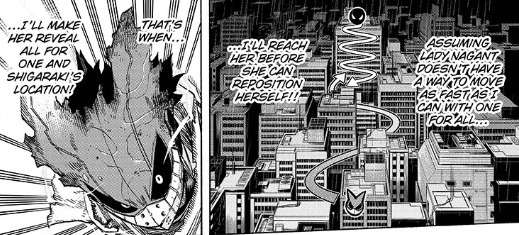
what’s more, it quickly becomes clear that he miscalculated and probably would have been better off following Hawks’s advice, seeing as he promptly gets himself shot, and subsequently realizes that AFO gave Nagant an extra quirk, something he hadn’t taken into account. but instead of cutting his losses and running at this point, he doubles down instead and not only breaks out Smokescreen, but also the Third’s quirk which he has never even used before.
it’s worth noting that both En and the Third start telling him to chill at this point, and warn him that what he’s attempting is too dangerous. but tbh if they were expecting him to listen, they haven’t been reading the same arc I’ve been reading. once again, Horikoshi makes it clear that Deku has one thing and one thing only on his mind right now.
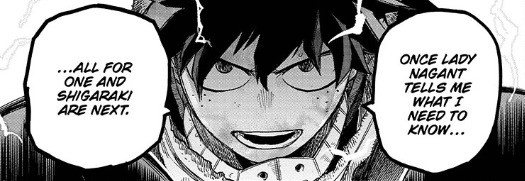
of course. once again it all comes back to this. hunt down AFO. it doesn’t matter that he’s exhausted. it doesn’t matter that he’s just been shot twice. it doesn’t matter that Hawks, despite knowing what Deku was capable of with his OFA abilities, specifically warned him away from this one person only. it doesn’t matter that even the Vestiges are trying to tell him you’re going too fast and you’re trying to do too much and it’s too dangerous.
he just doesn’t care. long story short, the only thing that matters to Deku right now is tracking down and defeating TomurAFO. and as the person who knows him best once so aptly put it, “he doesn’t take himself into account.” and therein lies the major challenge of this arc.
and so this is where we’re currently at now. and this has been a very long post, but if nothing else, I hope I was able to get this one point across: there is absolutely no way that Deku will be able to defeat TomurAFO as he is now. not a chance in hell. somehow he’s managed the uncommon feat of waging a war of attrition against himself, which is really quite an accomplishment. he’s not taking care of himself, and he’s refusing to listen to sound advice from the people surrounding him, and is trying to skip ahead to the final boss battle before he’s ready, because the guilt and pressure from feeling responsible for the current situation are eating him up. the only way that the world can go back to normal is if he can defeat AFO; therefore he has to do it as soon as possible, because time is running out and everyone is counting on him. this is who Deku is. and this is what inevitably happens when his saving mentality is taken to extremes, and left unchecked.
anyway so to wrap up this post now, I do think this arc is a lot more cohesive than it’s gotten credit for thus far, and Deku is the glue holding it all together. I for one am loving the exploration of his character and all the subtle little angsty touches as we build up to the big moment, whenever it finally comes. just keep in mind though that if his decisions right now seem reckless and short-sighted, it’s because they’re supposed to seem that way, because Deku is not in a good mental state right now. the cracks are finally showing in our perfect protagonist, just like everyone has been wanting this whole time. he is just a kid. he is doing his best. he is trying far too hard to do his best, and it is hurting him so badly, but he doesn’t even realize. this arc is not an endorsement of the Angsty Nomad Hero lifestyle, lol. it’s the exact fucking opposite, and I think it’s being wildly misinterpreted with all of the emphasis on “oh look at that, he mastered another quirk with no effort”, as opposed to “oh look at that, he is shutting down emotionally and is a few more missed nights of sleep away from a complete and total breakdown.”
tl;dr the overarching storyline of this arc is all about Deku slowly falling apart due to his trauma from Jakku, and the subsequent pressure that was put on him by the Vestiges with their whole “GUESS WHAT, YOU’RE THE LAST USER OF OFA, THAT’S RIGHT, IT’S ALL ON YOU BUDDY” pep talk. and mark my words, things are not going to go according to plan. something is going to go terribly wrong here. whether it’s something happening to All Might, or AFO setting up a trap for him, either way Deku is being set up to fail in a major way. unless of course, someone (or a group of someones) manages to intervene first, and possibly stage an intervention or something. it’s what he needs right now, but idk if Horikoshi is going to make it that easy.
anyway, but in other words, the point of this arc is not to show how much stronger Deku has gotten and how he doesn’t even need his friends anymore. it’s the exact opposite -- the point of this arc is to show that Deku needs his friends now more than ever. that in spite of OFA and all of its mystical trappings and fancy SIXQUIRKS, Deku can’t do this alone. he needs his friends. that’s the core message. and right now, we are at the “I can get by on my own” part of the story. and the part we are all waiting for, but which is coming -- I guarantee it is coming, you guys -- is “the thing is, you don’t have to.”
and that shit is going to slap hard you guys. and I for one can’t wait. but until then, enjoy the angst.
#bnha 313#midoriya izuku#bnha meta#deku meta#bnha#boku no hero academia#bnha spoilers#mha spoilers#bnha manga spoilers#makeste reads bnha#long post#like 'long' is really an understatement here lol#our little green protagonist is really going through it you guys#and I just have a lot of thoughts and feelings about it
491 notes
·
View notes
Text
the deuce hbo porn david simon

The Deuce, James Franco, Maggie Gyllenhaal
‘The Deuce’: HBO’s big, ambitious porn drama It’s safe to say very few HBO subscribers are going to wish they’d been around for the heyday of 1970s Times Square, the site of the channel’s new prestige product The Deuce, premiering Sunday night. Show creators David Simon and George Pelecanos have, in the tradition of previous collaborations such as Treme and The Wire, done their due diligence in research. Over its eight episodes, The Deuce –possible alternate title: Game of Condoms–takes you for a tourist stroll down New York’s 42nd Street to gawp at strolling prostitutes, strutting pimps, small-time drug dealers, addicts, X-rated bookstores, massage parlors, peep booths, and your random street person peeing in a phone booth, all of it wreathed in swirls of the rank, uncollected garbage that overflowed the neighborhood, thanks to the blind eye averted by then-Mayor John Lindsay. The Deuce is an anti-nostalgia trip.
The central characters are a pair of twin brothers, Vincent and Frankie Martino. Vincent is a decent fellow, a bartender who falls under the patronage of a notably kind-hearted organized-crime figure who sets him up with his own Times Square bar, the Hi-Hat. Frankie, more of a disreputable hustler, gets involved in the then-aborning massage-parlor business. The brothers are both played by James Franco, and if you want to yelp, “Please, one Franco is more than enough!” I hear you: I had the same thought, but the actor and the producers manage to pull off this twin act with a minimum of over-Francofication. All by her lonesome is Maggie Gyllenhaal as Eileen, a prostitute who uses the street name “Candy” and who, from the start, is presented as smarter—more savvy and independent–than the sea of female flesh around her. She’s the only hooker here who isn’t under the command of a pimp, and as the series progresses, she evinces an interest to move from a porn actress in front of the camera to a director and producer behind it. The Deuce has a full assortment of prostitutes, nearly all of them heartbreakingly deluded and under the firm control of pimps who work them to exhaustion. The pimps themselves are also vividly portrayed, and some of them, such as Method Man and Gbenga Akinnagbe, are familiar faces from The Wire.
youtube
Simon is working in prime Balzac mode here, cramming lots of vivid characters and sub-plots into the show, from Vince’s romance with Abby, a posh WASP college student (Margarita Levieva) to the plight of an honest cop (Lawrence Gilliard, Jr.) who watches his blue brotherhood skim profits off of local businesses. Simon has long approached his TV work as a realist canvas upon which he can explore issues of economic oppression and the exploitation of labor in the class-bound society America refuses to admit it is. One thing that made The Wire one of the greatest achievements ever on television is the way Simon found a way to address these themes within a different institution each season (schools, city politics, the newspaper media, etc.) with rigorous arguments fleshed out by bright, vital characters from every level of society. There was a warmth, a passion, an allowance for humor even amidst tragic circumstances, that ennobled The Wire, and which is somewhat lacking in The Deuce, which seems oddly squeamish about making enjoyable what was indeed enjoyable about Times Square in this era: its democratic approach to entertainment (this is hinted at in the show’s glimpses of 42nd Street movie houses, where mainstream movies like Patton and M*A*S*H ran alongside cheesy exploitation flicks) and its complication of sex as something more than furtive, shameful pleasure.
I don’t want you to read this as a pan, or a negative review, however. I gobbled down all eight episodes of The Deuce as quickly as I could, and I was drawn in and fascinated by every minute of it. The Deuce is an admirable piece of work. The novelists Richard Price, Megan Abbott, and Lisa Lutz wrote scripts for the show, and half the episodes are directed by women including the mighty Michelle MacLaren (Breaking Bad, The Walking Dead), who oversaw the pilot and season-ender. There are some terrific performances here, from Gyllenhaal most of all, but also Franco, Dominique Fishback as a bookish prostitute, and Chris Bauer as a construction worker who finds his true calling as a massage-parlor manager. There are a number of excellent smaller roles as well. David Krumholtz, for example, is terrific as a porn director with a heart of gold. (Additional value: Krumholtz looks like a legendary porn actor of that era, Ron “The Hedgehog” Jeremy.)
But any fair review of The Deuce must grapple with the tricky position Simon finds himself in here. He is obliged, for instance, to present the violence pimps visit upon their charges, yet he’s also well aware of the glorious mythos that numerous African-American writers and filmmakers have constructed around the pimp-as-rebel-adventurer, as one way black men took back some authority from white law-enforcement and racism in general. (Just look at movies set in the same era as The Deuce such as 1973’s The Mack, the raucous Dolemite in 1975, and most of all, Melvin Van Peebles’ revolutionary Sweet Sweetback’s Baadasssss Song, from 1971.) The Deuce nods to these influences in its numerous, entertaining scenes of the show’s pimps sitting around a coffee shop discussing the exasperating minutiae of pimping. But there is a level on which Simon also knows damn well that if he depicts that violence too vividly, without punishment to its perpetrators, his enterprise will probably be labeled exploitive. Given his progressive politics, it’s relatively easy for Simon to limit his portrayal of sex workers as female bodies reduced to a commodity (which is, of course, prostitution’s brutal economic model), but since when has Simon ever gone the easy route? The Deuce cannot be removed from the current cultural climate, and in particular the one HBO inhabits just now. It’s been said that HBO needs another Sunday-night hit to take the place of Game of Thrones, whose next season won’t appear for, possibly, a number of years. You remember Game of Thrones—the fantasy show that was harshly condemned by social media for the way it depicted violence against women, condemnation that made its producers so leery of further criticism, they softened their storytelling considerably. You can feel a similar constraint against which Simon and his writers, consciously or unconsciously, are pushing during key moments in The Deuce.

The Deuce, Dominique Fishback and Method Man
The series is set during that brief moment when pop culture and the entertainment business thought porn might break through as mainstream entertainment. The skin industry began imitating its artistic betters, holding—and depicted here in all their tawdry glory–red-carpet movie premieres and industry parties to celebrate the openings of Deep Throat and the gay-porn milestone Boys in the Sand, which insisted on referring to itself as “erotica.” Of course, we know that this breakthrough never ultimately occurred; that Throat star Linda Lovelace would eventually write an autobiography about her captive exploitation. And that the Times Square scene probably peaked with the opening of Show World, on 42nd and 8th Avenue in 1977, a multi-story Tower of Babe-el combining porn-loop booths and live sex shows conceived as a 24-hour, non-stop semen-exploiter.
There was no middle-American embrace of porn as legit entertainment, only the nation-wide success of skin-mag publishers like Al Goldstein (Screw magazine) and Bob Guccione (Penthouse), along with an underground explosion of pornographic films, initially sold on sticky VHS tape for the privacy of one’s own home pleasure. Which is one of the reasons why Gyllenhaal’s character is constructed around a false premise. Her character arc insists that women, if they had drive and ambition, could break through to make explicit sex movies that had an inherently female point of view, that women could labor shoulder-to-shoulder with men to create a more equal-opportunity industry. But we know that never came to pass. There were no highly successful female porn directors, and has there ever been an accomplished director, female or male, who graduated XXX-rated porn (as opposed to R-rated exploitation films)? The most that women achieved when not being filmed and ogled were production credits in less-popular films (Nina Hartley, for example) or the editorships of soft-core mags (Gloria Leonard and High Society; Dian Hanson’s Juggs and Leg Show). Thus, Candy/Eileen is really a fantasy, a largely unrealistic character placed at the center of David Simon’s super-realist project. Candy/Eileen is the idealist dream demanded by the proper authorities of pop culture nowadays. Intelligent yet abused, Candy is The Deuce equivalent of The Wire’s Bubbles, equally intelligent and abused, a street person doomed to tragedy. The difference between the two is that Simon was able to grant Bubbles varied scenes that showcased his street-smarts and his wry sense of humor; his weaknesses as well as his moral strength. Gyllenhaal inserts that wry humor and wily acuity where she can into her performance, but Candy’s trajectory as a character is limited to a predictable fall-and-rise success story pattern, as more or less demanded by the current cultural atmosphere in which no female protagonist in a prestige project can be depicted as weak or vulnerable or less than a triumphant figure.
More broadly, The Deuce implies that pornography is always grim, degrading stuff—common wisdom in the 21st century. Banished from the current scene are the sorts of feminist, pro-porn arguments once made by the great radical cultural critic Ellen Willis, who in her essential 1979 essay “Feminism, Moralism, and Pornography,” argued that to deny the pleasures of porn is to “make a lot of women ashamed of their sexual feelings and afraid to be honest about them.” The Deuce gets at a little of this in its final episode, when Gyllenhaal’s character finally throws off her Candy image to become Eileen the director of porn scenes from a woman’s point of view. That it took eight episodes to get there suggests two things: that The Deuce is rather muddled in its sense of purpose, and that this show really deserves a second season, to show us whether the series can take Eileen and her sisterhood into a more complex realm.
The Deuce airs Sunday nights at 9 p.m. at HBO.
#_revsp:wp.yahoo.tv.us#_uuid:a5b8be29-fc63-356c-92c4-b917a8b16c24#hbo#the deuce#david simon#maggie gyllenhaal#james franco#_author:Ken Tucker#game of thrones#_lmsid:a0Vd000000AE7lXEAT
0 notes